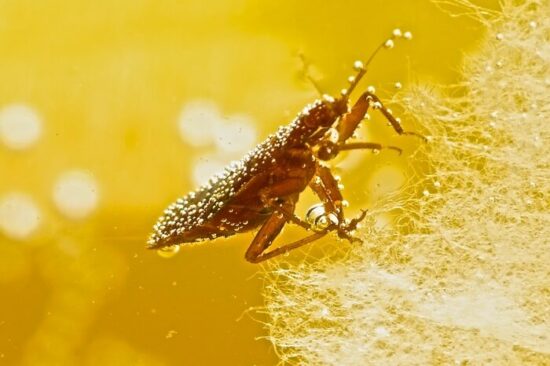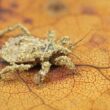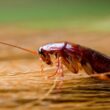It’s only natural to wonder if bed bugs can survive in water or if they’ll drown. After all, water is typically one of the most effective ways to kill things!
But with these tiny critters it’s not that simple.
This guide will help you understand the situations where bed bugs might survive or die in water. Once you know them, you’ll be able to decide how you want to use water to get these pests out of your home!
Table of contents
Can Bed Bugs Survive In Water?
Bed bugs are master evaders and cunning escape artists. They have a reputation for being one of the most difficult household pests to get rid of. When you consider their lifestyle, it’s not hard to see why.
These pests live in places most people overlook. From the deep recesses of your furniture to cracks in the wall, they occupy them all. Pair that with their nocturnal nature, and bed bugs can resist just about any form of capture.
On top of all that, they’re one of the few insects in your home that will often avoid traps.
All that said, there is one thing they can’t outrun forever, water.
Bed bugs have limited survivability in water. They can stay submerged for a lot longer than humans and other insects, but it’s only a matter of time until they drown.
- Kill bed bugs and bed bug eggs
- Use spray as a spot treatment around bed frames, mattress seams/tufts/folds, and baseboards
- Kills even the toughest bed bugs
- The continuous spray Comfort Wand easily gets into hard-to-reach areas
Interestingly enough, bed bugs hate water. It presents a persistent threat. These insects don’t encounter water at all in their natural habitat.
Bed bug nests are dry, and the only form of moisture they encounter is blood.
Quick Tip: Unlike most insects and animals, bed bugs don’t even drink water!
They still need fluids to stay alive, but they get it from the blood they consume rather than pure water. It’s an interesting quirk that you can use to your advantage when trying to get rid of bed bugs.
Can You Drown A Bed Bug?
It is possible to drown a bed bug. However, doing so is a lot harder than you think due to their use of surface tension. In most cases, it’s a lot easier and more practical to use other methods of extermination.
Remember how we said that bed bugs could survive in the water longer than humans and other insects? That’s not hyperbole. Bed bugs can persevere for several hours.
That’s an awfully long time to dry and drown these pests! Technically speaking, you could drop them into a jar of water and wait it out. But even doing that is difficult.
Drowning bed bugs is simply not a viable option in most infestation cases. It would require capturing bugs one by one or filling your entire room with water to drown the colony.
There are far better ways to get rid of bed bugs!
Are Bed Bugs Good Swimmers?
Bed bugs are not good swimmers. In fact, these bugs will struggle in only a little bit of water!
You see, bed bugs have a distinct body that’s not conducive for aquatic life.
First off, while the size of bed bugs isn’t very large, the exoskeleton is large and flat. The profile is naturally buoyant, causing the bug to float right to the top of the waterline. This is actually good news for the pest because it prevents full-on submersion.
However, they have no way to swim to safety as they float. Their six legs are tiny and weak. Even on land, bed bugs struggle to crawl quickly. In the water, their appendages do nothing to help with survival!
To make things even worse for them, water impacts their ability to get oxygen.
Bed bugs are pretty complex in terms of biology. They don’t respirate in the same way that mammals do. The bug’s anatomy doesn’t include lungs or even nostrils for breathing.
Instead, bed bugs have numerous pores all over their exoskeleton. Water quickly fills the pores and prevents breathing, which is why they will eventually drown.
Will Hot Water Kill Bed Bugs?
If you want to use water to exterminate bed bugs, it’s important to make it hot.
These insects are very resilient and can live in a wide range of climates. They find a way to survive in both scorching hot summers and freezing winters.
That said, they do have their limitations when it comes to hot water (and heat in general).
Bed bugs cannot survive prolonged exposure to temperatures above 115 degrees Fahrenheit or above. When their body temperature reaches that threshold, the pests essentially bake in their shells.
The same goes for the eggs! Eggs are no match for hot water. In most cases, the developing insect inside will die long before the adults do.
Now, 115 degrees is the coolest you can go if you want to kill the bed bugs in hot water. However, most experts agree that starting around 140 degrees is a more reliable choice.
Quick Tip: At 115 degrees, it’s a slow kill. It may take up to 30 minutes or so for the bed bugs to reach their demise. Much hotter temperatures, on the other hand, can lead to instant death!
140 degrees is a relatively safe temperature to work with, but some people like to resort to boiling hot water. While that will undoubtedly cause a quick death for bed bugs, there are some risks involved!
Boiling water can severely burn your skin and damage your furniture. 140-degree water can cause injury as well. But, boiling water can result in third-degree burns on contact.
It’s best to err on the side of caution and use safe and reliable hot water supplies when dealing with bed bugs.
What About Cold Water?
Unfortunately, cold water doesn’t have the same impact on bed bugs as hot water does.
Cold water presents virtually no threat to these insects.
Bed bugs can stay active in temperatures as low as 46 degrees Fahrenheit. However, these resilient pests can lower the freezing point of their body fluids, too.
- Kill bed bugs and bed bug eggs
- Use spray as a spot treatment around bed frames, mattress seams/tufts/folds, and baseboards
- Kills even the toughest bed bugs
- The continuous spray Comfort Wand easily gets into hard-to-reach areas
As a result, bed bugs can survive in near-freezing temperatures for several days.
Even if you douse them in ice-cold water, your blood-sucking invaders are likely to continue going. The only way cold water would kill them is through drowning or freezing the water to solid ice.
How Long Can They Live In Water?
We already know that bed bugs can “hold their breath” for several hours. But how long can they realistically survive?
Whether they’re floating or fully submerged, bed bugs can survive underwater for a full 24 hours. If they have access to ledges or spots to catch their breath, it could be even longer until they succumb to a watery grave.
While drowning them in water is technically a viable way to kill bed bugs, are you ready to wait 24 hours for it to do so? Chances are, it’s much faster to squash them or find more robust extermination methods.
Popular Water Mixtures Homeowners Try
While using traditional means to drown bed bugs isn’t the most efficient way to go, there are other ways to use water to your advantage.
Water mixtures are a great way to stop these pests in their tracks. Some water-based solutions do a fantastic job of exterminating bugs on the spot. Others take a little longer to work or act more as a repellent.
Either way, these solutions could be worth trying out.
Soap & Water
The jury is still out on the efficiency of soap.
Some say that it has no impact on bed bugs at all. However, there’s some evidence to suggest it does. Soap is a common ingredient in many commercial insecticides.
Not only that, but borax is a popular detergent that many use to eradicate pests.
So, what about bed bugs?
The best kind of soap to use for these pests is dish soap. Dish soap is specifically formulated to cut through grease and dissolve food residue.
The fatty acids in the soap also wreak havoc on hard-shelled insects. It slowly dissolves their exoskeleton, which ultimately leads to slow dehydration.
Because bed bugs are hard-shelled, it should work on them, too.
Of course, direct contact is the only way to use soapy water against these pests. You have to douse them in the solution to see any real benefits.
On the plus side, you can keep that soapy formula nearby to get rid of other pests. It’s particularly effective against fleas and garden bugs.
Quick Tip: Soap also acts as a surfactant. When mixed with water, it breaks the surface tension and eventually causes the bed bugs to die beneath the surface.
Vinegar & Water
Vinegar truly is one of the most versatile things you can have in your home!
In addition to getting rid of messes and covering up smells, vinegar works wonders against pests like bed bugs. It works in a couple of different ways.
When sprayed directly onto bed bugs, vinegar’s acidic nature disrupts the nervous system. In addition to preventing the bugs from breathing, vinegar can also dehydrate bed bugs.
Most pests hate the smell of vinegar as well. Bed bugs are no exception. The odor is so intense that many avoid it at all costs. As a result, vinegar works well as a deterrent.
Straight white vinegar has the most significant impact on bed bugs, but it comes with a lingering smell that lasts for several days. To avoid that, you can dilute the vinegar with equal parts of water.
A vinegar and water solution is less potent but should still do the trick.
Bleach & Water
You can’t go wrong with bleach.
Like vinegar, bleach throws off many biological processes. It suffocates the bugs on contact.
Any form of bleach will kill bed bugs on contact. However, we always recommend diluting the bleach with water to be on the safe side.
Concentrated bleach is very potent and can cause some serious health issues if you’re not careful. Skin contact will result in burns and irritation. If you inhale the fumes too much, you can also get sick.
Plus, pure bleach will damage your furniture!
Quick Tip: Mix the bleach with hot water in a ratio of 1:1. Shake it up in a spray bottle, and you’re ready to attack bed bugs safely.
Alcohol & Water
In theory, alcohol is an excellent tool to have in your pest-killing arsenal.
Pure alcohol has the same influence over bed bugs as bleach and vinegar. The main difference is that it dehydrates bugs instantly when poured over their body.
Not only that, but alcohol dries nearly instantly. So, you shouldn’t have to worry too much about drying surfaces.
Alcohol is actually more powerful when used without any water, but sometimes mixing it makes more sense. Dilution is possible, but the potency dips when water is added to the mix.
While it might be tempting to try alcohol, it’s best to refrain unless it’s the only thing you have on hand. Alcohol is hazardous when used throughout your home as a spray. It’s flammable and could easily cause a fire if you’re not careful.
Furthermore, alcohol has no residual effect. It kills on contact and dries up to leave nothing behind. Other insects will still venture into the area as if nothing happened.
Salt & Water
You might see some people using a mix of salt and water to take care of bed bugs.
The idea is that salt will dehydrate them like other substances. Salt indeed has impeccable liquid-absorbing powers. But that only applies when using it dry.
If you mix it with water, the salt actually becomes pretty useless. The most it will do is cause some slight irritation if you douse the bugs in it. It may even drown them if you’re super vigilant. Beyond that, it’s nothing more than a nuisance.
Some people try only killing bed bugs with salt, but it’s not effective. It’s much more economical and practical to use something like diatomaceous earth instead.
Flushing Bed Bugs Down The Toilet
Generally, attempting to flush bed bugs down the toilet isn’t a good idea.
At face value, it might seem like the perfect way to rid those pests from your home. It physically removes the bug and sends them to the sewer or septic tank.
All that said, many practicality issues arise when you approach the situation logically.
First, how are you planning on getting the bed bugs into the toilet in the first place?
Unless you hand-pick each bug and toss them into the commode, there’s no real reason to go this route. You’ll rarely find bed bugs in your bathroom, and it’s hard to collect a bunch and separate them from the bed or linens they’re infesting.
Quick Tip: The only way you’d flush down enough is if you managed to catch and contain a massive nest (which is sometimes possible through vacuuming).
So, let’s say that you are lucky enough to fill your bowl with bugs to kill. When you flush, there’s a good chance that some will stick around in the trap, under the rim of the bowl, and any other place they can escape.
It might look like you got rid of them all, but you’re really just increasing your risks of the infestation spreading quickly.
Another big issue is the potential for bugs to make their way back. A vast majority of the insects you flush will drown in the water of the sewage pipes or septic tank. But a few strong survivors might sling to pipes on the way down and eventually emerge to invade your home again.
Overall, flushing bed bugs down the toilet isn’t a super viable method for extermination. You can use the commode to get rid of stray bugs you find here and there. But as far as mass eradication goes, you’re better off using other methods of disposal.
Wrapping Up
Now that you know how long bed bugs can survive in water, it should be pretty clear that a straightforward drowning strategy won’t cut it.
But if you use some of the other tricks we mentioned, you’ll be able to use water to get rid of these pests once and for all!



